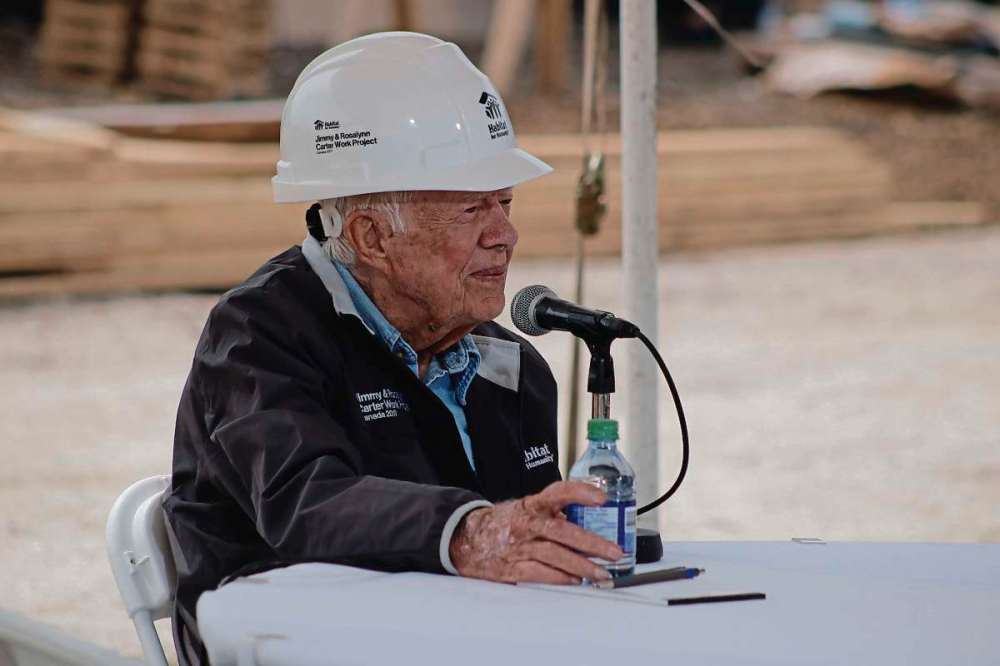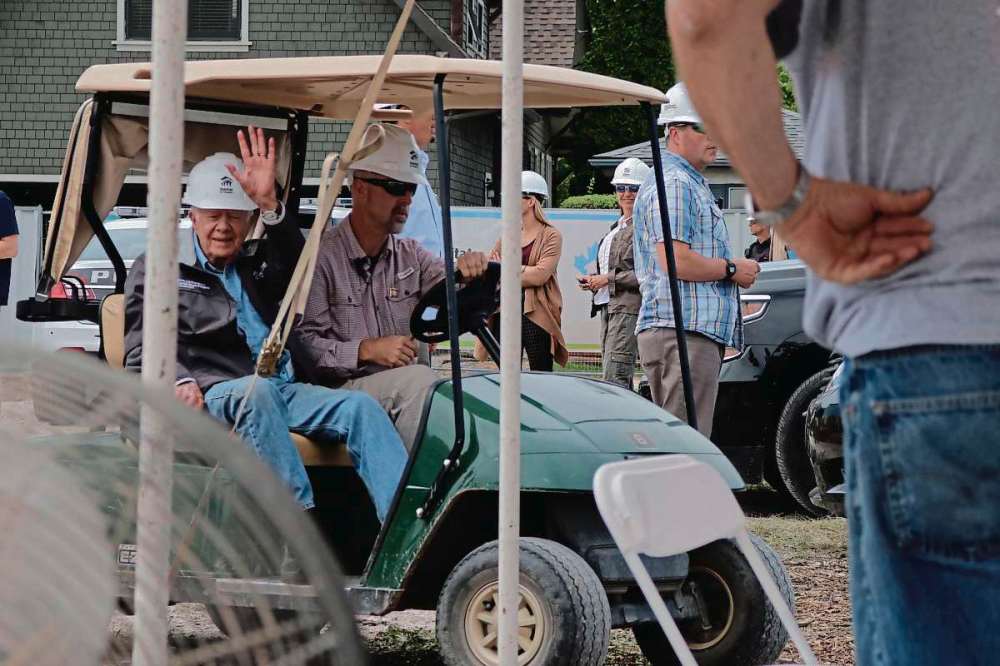A moral and ethical duty
Former U.S. president Jimmy Carter comes back to Winnipeg after 24 years to work on Habitat for Humanity project
Advertisement
Hey there, time traveller!
This article was published 19/07/2017 (3030 days ago), so information in it may no longer be current.
It took more than a Manitoba summer to keep Jimmy Carter from swinging a hammer.
On Thurs., July 13, the 92-year-old former president of the United States of America collapsed of dehydration while helping with construction of a Habitat for Humanity home on Lyle Street in St. James. After spending a night at St. Boniface General Hospital to recover, Carter was back at the site the next day, full of energy to resume his work and to talk to reporters about the value of volunteering with Habitat for Humanity.
Carter and his wife, Rosalynn, were in Winnipeg as part of Habitat for Humanity’s 34th Jimmy & Rosalynn Carter Work Project, which is helping 150 families across Canada build and own their homes in celebration of the 150th anniversary of Confederation. Twenty-five of these homes are being built in Manitoba — 16 permanent homes built on the site of the former St. James police station at 210 Lyle St.; five ready-to-move homes that will be moved upon completion to infill lots on Madison Street, Larson Street, Alexander Street and Jefferson Avenue; and another four homes in Brandon and Portage la Prairie.

At the end of the day on July 14, each of the 21 families who will be living in the Habitat for Humanity homes received a Bible from Carter, who first visited Winnipeg in 1993 to take part in a Habitat for Humanity project.
Carter said his childhood experiences living in a segregated community led him to become committed to human rights and that working with Habitat for Humanity enables him to turn that commitment into action.
“I had a very lucky childhood, but all my neighbours were African-Americans, and I saw that many of them didn’t have the same privileges that we did,” he explained. “I saw the devastation that came both to white people and black people in the Deep South because of racial segregation.”
Carter and former First Lady Rosalynn started working with Habitat for Humanity in 1984 and have dedicated their time every year since then. He said they continue to work tirelessly in his Habitat projects because they feel it is part of their Christian duty.
“We see that basic human rights derive from the moral and ethical values of Christianity,” he said. “It’s so hard to find a way to break down the barriers between people like us who are very fortunate to have everything and people who don’t have a decent home in which they live in.”
He told Canstar Community News that working on Habitat projects has never been a sacrifice, but a benefit to both him and his wife.
“I get more out of it than I put into it,” he said.
Carter explained he has seen different causes for poverty. He said the greatest challenge the world faces in the new millennium is growing income disparity — and disparity between wealthy countries and developing countries — which denies people access to basic needs such as a place to live.

“A lot of families around the world are paying more than 50 per cent of their total income just to rent an inadequate place to live,” Carter said. “So Habitat has projects to give people a decent place to live where they build themselves or pay for themselves and also leaves enough income to take care of their other basic needs.”
Habitat for Humanity helps families become homeowners. Participating families pay full price for their homes and put 500 hours worth of sweat equity into building their own houses. Carter added that Habitat for Humanity follows the biblical teaching that when people lend money to the poor, they should not charge interest. Therefore, monthly payments for Habitat homes are interest-free and can’t take up more than 25 per cent of the family’s total income.
When families realize the dream of affordable home ownership, many things change for them, Carter said.
“Habitat for Humanity promotes a sense of self-worth. We see school children go up three or four grades in school because they have a house and teenage boys… are proud to bring their friends to their Habitat house. The kids stay at home, and they have a place to study, and the parents quite often have a sense they can help that kid.”
Carter concluded by saying that volunteering with Habitat for Humanity puts moral and ethical values into real practise and that it is an opportunity for exploration of life, for expanding self-consciousness and for building relationships with other people.
History
Updated on Thursday, July 20, 2017 11:57 AM CDT: Corrects errors re: number of Bibles distributed and hours of sweat equity




